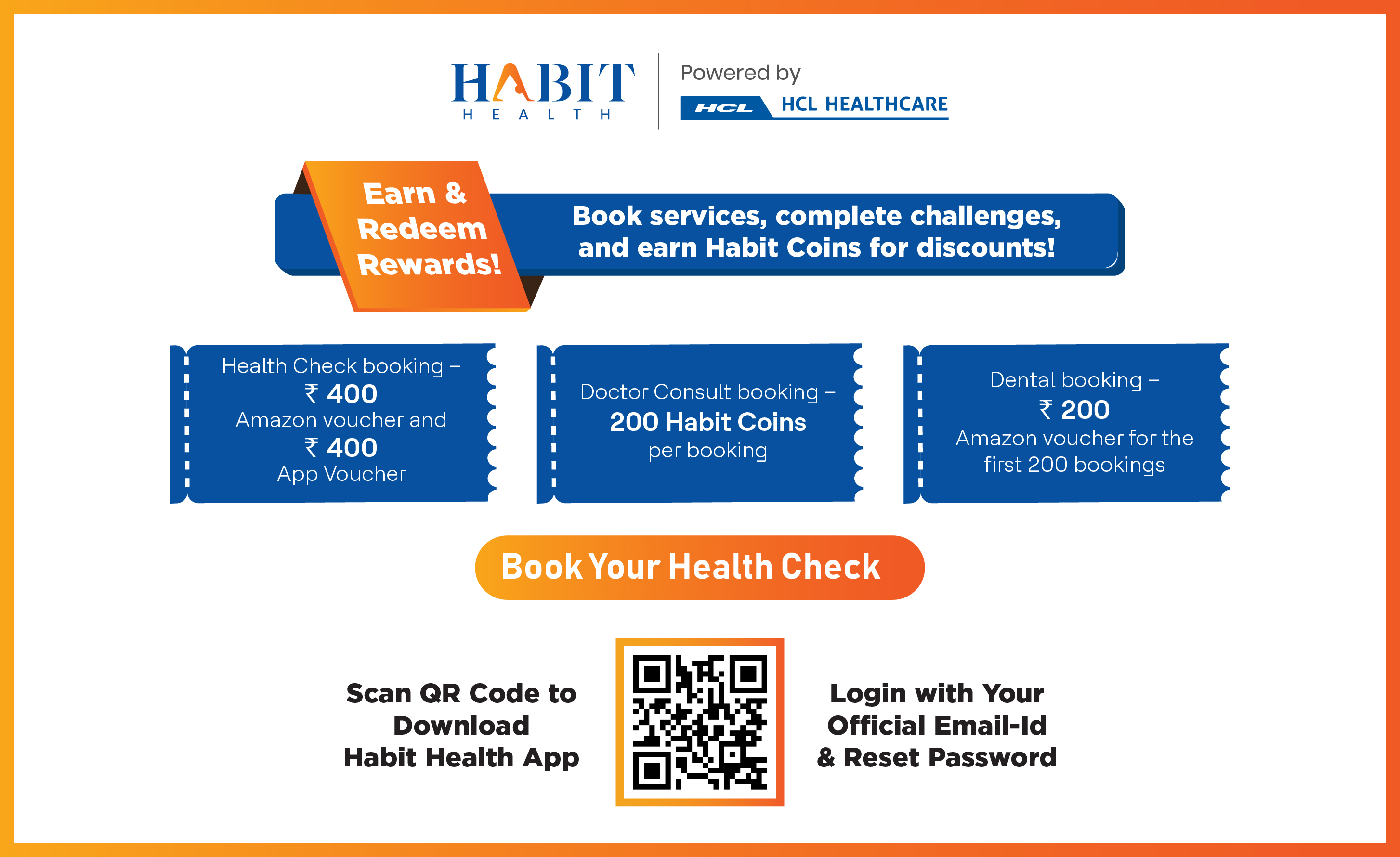How can employees make better health decisions?
After two years of the COVID pandemic, we do not need to reiterate how important it is to take care of one’s health. All of us have witnessed enough health scares around us to know that just age or weight are not the factors that can indicate the status of our health. Like we pay attention to our workplace deliverables and our finances, we need to monitor our health parameters and take preventive steps so that we stay fit and healthy.
In this article, we discuss how to take control of your health so that you remain on top of your health game and use the facilities provided, to the optimum. A little proactiveness and three words – Know, Access, and Act – can help you take charge of your health and thus your life. Read more to find out how:
KNOW
- Annual Health Check-up: One of the first steps to taking control of your health is to know your health parameters and the easiest way to do that is to undergo regular health check-ups. “Only if a person goes for a health check-up, will the doctor be able to guide the patient to prevent health issues in the future like to quit smoking, go for vaccination or make dietary modifications,” said Dr Amit Kumar Gupta, Senior Consultant and Head, Medical Services and Quality, HCL Healthcare. Most employers provide annual executive health check-ups that cover most of the basic tests that tell you the status of your heart, liver, kidneys, blood pressure, blood sugar, cholesterol, other blood profile parameters, etc. Remember, it is common to feel anxious and want to avoid health check-ups but keep in mind, that it is better to know about your health issues now than suffer later.
- Health Insurance: A sudden hospitalization can strain your finances and cause unnecessary worry. Thankfully, most employers provide health insurance cover for their employees and to some extent their families. This means you can make the best decision for your health without worrying about how much it will affect your bank balance. But just knowing you are covered is not enough, go through your employer’s health insurance documents to know what is covered, if there is any waiting period, what are the limits? If you think that the cover is not sufficient, you should invest in a personal health insurance cover that provides the additional protection you need for the health of you and your loved ones. Remember to inform your family also about these arrangements in case of emergencies.
ACCESS
- In-house services: Once you know how your health parameters are, you should access the health services and expertise that are available to you. For example, HCL Healthcare provides virtual doctor consultations by specialists including internal medicine specialists, gynaecologists, paediatricians, dermatologists, dentists, physiotherapists, and dieticians. For seeking consultation and guidance, you can book appointments with these experts by using the registered number given on their website.
- Health management plans: It is important to know that chronic conditions like diabetes, hypertension, obesity, and thyroid issues require constant monitoring and customized planning. Therefore, you should opt for disease management plans which will give you doctor consultation, regular follow-up, detailed health examinations, and diet advice. Being proactive about managing conditions will help you prevent complications that follow these chronic conditions.
- Emotional wellbeing: Do not forget your emotional well-being when you think about your health. Like any other condition, it is important to seek help from trained counsellors, psychologists, and psychiatrists if you have mental and emotional issues. These experts have a neutral perspective, have great listening skills, and can offer skills that will help you feel better.
ACT
After getting to know your health status and getting a consultation from the doctor, it is now important to act and implement those lifestyle changes and medicines if advised. We give you a list of things you need to pay attention to irrespective of your age and health status.
- Sleep: The importance of getting a full night’s (7-8 hours) sleep cannot be stressed enough. Those with sleep deficiency have a greater risk of many health complications including heart disease, high blood pressure, diabetes, stroke, and obesity according to the US’s National Heart, Lung and Blood Institute. A good night’s sleep is also important for memory, cognitive functioning, and mood regulation. Experts recommend getting sun exposure during the daytime, reducing screen time exposure during evenings, having a fixed sleeping schedule, and taking melatonin supplements to sleeping better at night.
- Diet: In order to improve your fitness level, you have to improve your diet. Few tips include avoiding packaged foods, including green leafy vegetables and fruits, and increasing protein intake. There is growing evidence that a low-carbohydrate diet can help manage diabetes, reduce weight, control blood pressure, decrease bad cholesterol and improve good cholesterol.
HCL healthcare has in-house dieticians who can guide employees wanting to make modifications to their diet. - Exercise: It is important to spend at least 30 minutes each day in some form of exercise. Physical activity has been proven to prevent cardiovascular disease, diabetes, cancer, hypertension, obesity, depression, osteoporosis, and premature death. To be consistent, choose a form of exercise that you will enjoy, be it sports, swimming, dance, or gymming. To start small, start by walking 10 minutes each day and increase it to reach 30 or 60 minutes in about a month. It would be a good idea to seek consultation from a physical trainer or physiotherapist before you begin any new workout.
- De-stress: It is important to counter stress from day-to-day life by spending time doing activities you enjoy, be it art, spending time in nature, cooking, playing, or indulging in another hobby. Meditation is also an excellent way to counter stress. If you are short of time, try finding at least 10 minutes each day in mindfulness practice. Mindfulness has been shown to increase cognitive ability, improve working memory, counter stress, and improve focus.




